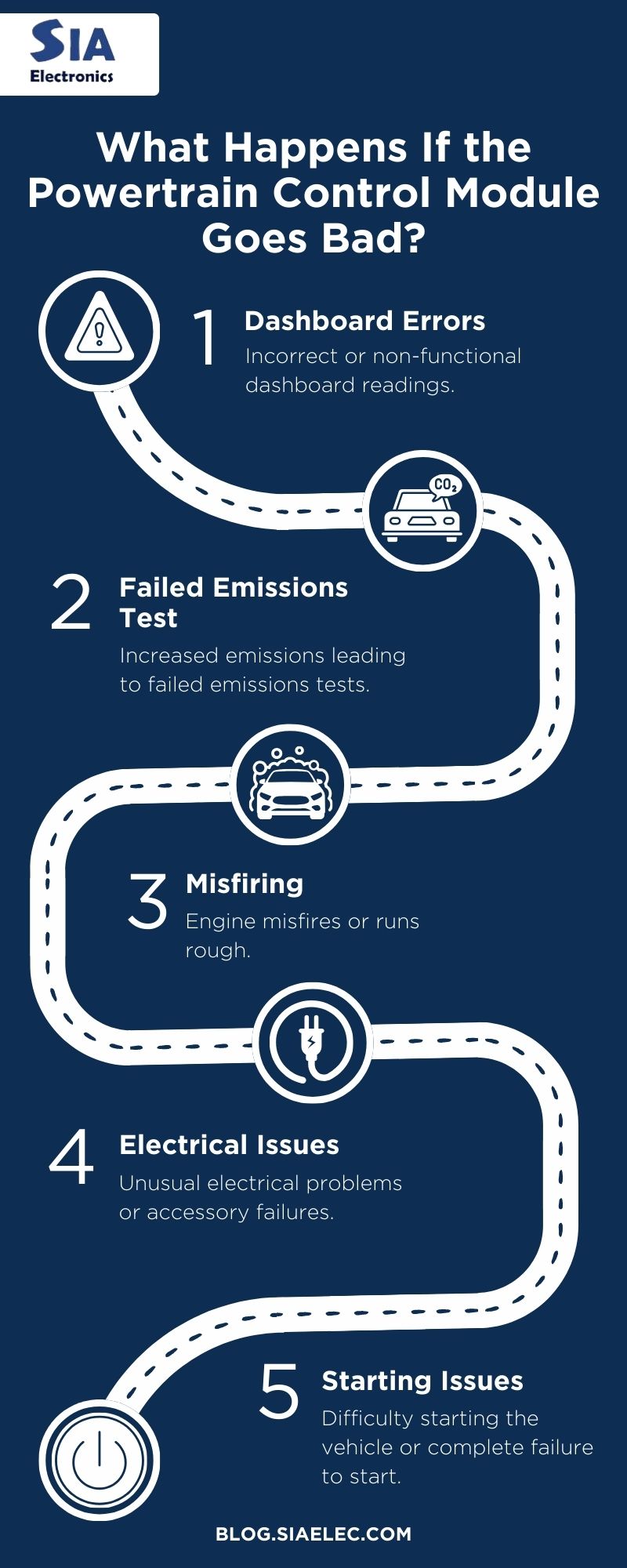Introduction
The powertrain control module (PCM) is a crucial component in your vehicle's engine management system. It orchestrates the functions of the engine and transmission to ensure optimal performance and efficiency. When the PCM starts to malfunction, it can lead to a range of issues affecting your vehicle's operation. In this blog, we will delve what happens when a Powertrain Control Module goes bad, its potential consequences, diagnosis methods, and replacement costs.
Table of Contents
Understanding the Powertrain Control Module
The Powertrain Control Module (PCM) is an integrated unit responsible for managing the engine and transmission functions in modern vehicles. It collects data from various sensors, processes this information, and sends commands to the engine and transmission systems to optimize performance and fuel efficiency. The PCM ensures that the vehicle operates smoothly, meets emission standards, and delivers the best driving experience.
Common Symptoms of a Bad Powertrain Control Module
A malfunctioning PCM can manifest in several ways. Here are some common symptoms:
- Check Engine Light: One of the first indicators of a problem with the PCM is the illumination of the check engine light on your dashboard. This light signals that the vehicle's computer system has detected an issue.
- Poor Engine Performance: If the PCM is failing, you might experience reduced engine performance. This includes issues such as hesitation, stalling, or rough idling.
- Transmission Problems: Since the PCM also manages transmission functions, a bad module can lead to erratic shifting, slipping gears, or delayed acceleration.
- Increased Fuel Consumption: A malfunctioning PCM may incorrectly calculate fuel needs, leading to poor fuel efficiency and increased fuel consumption.
- Starting Issues: Difficulty starting the vehicle or experiencing intermittent starting problems can be a sign of a faulty PCM.
- Unusual Noises: Strange noises, such as knocking or pinging, can sometimes be traced back to issues with the PCM's control over the engine.
What Happens If the Powertrain Control Module Goes Bad?
If the PCM fails, it can have several detrimental effects on your vehicle:
- Decreased Performance: A malfunctioning PCM can lead to poor engine performance, reduced acceleration, and overall decreased vehicle efficiency.
- Emissions Failures: Since the PCM helps regulate emissions, a failure can result in increased emissions and potential failure of emissions tests.
- Transmission Failures: The transmission may behave erratically, leading to problems such as slipping gears, rough shifts, or even complete transmission failure.
- Potential Safety Risks: Driving with a faulty PCM can affect vehicle safety, including issues with traction control, stability control, and braking systems.
How to Diagnose a Faulty Powertrain Control Module
Diagnosing a faulty PCM involves several steps:
- Scan for Error Codes: Use an OBD-II scanner to check for error codes stored in the vehicle's computer system. These codes can provide insight into whether the PCM is the source of the problem.
- Visual Inspection: Examine the PCM and its connectors for signs of physical damage, corrosion, or loose connections.
- Check Sensor Inputs: Ensure that all sensors connected to the PCM are functioning correctly. Faulty sensors can sometimes cause PCM issues.
- Perform Functional Tests: Conduct tests to check the PCM's response to various inputs and outputs. This can help determine if the module is operating correctly.
- Consult a Professional: If you're unable to diagnose the issue yourself, it’s best to seek the help of a qualified technician who can perform a more thorough diagnostic.
Cost of Replacing a Faulty Powertrain Control Module
The cost of replacing a faulty PCM can vary based on several factors:
- Parts Cost: A new PCM typically costs between $300 and $1,000, depending on the make and model of your vehicle.
- Labor Costs: Labor costs for installation and programming can range from $100 to $200, depending on the complexity of the job and local labor rates.
- Additional Costs: If the PCM needs to be programmed or re-flashed, additional costs may apply. Some vehicles require specialized programming, which can add to the overall expense.
Overall, you can expect to pay between $500 and $1,500 for a complete PCM replacement, including parts and labor.
Conclusion
The powertrain control module plays a vital role in the smooth operation of your vehicle. Understanding the symptoms of a faulty PCM can help you address issues early and avoid more significant problems. Regular maintenance and timely repairs are key to ensuring that your vehicle remains in optimal condition. If you suspect a problem with your PCM, consult a professional for diagnosis and repair to keep your vehicle running smoothly.
FAQs on
What Happens If the Powertrain Control Module Goes Bad? | Symptoms & Solutions
-
1. What is the role of the powertrain control module in a vehicle?
Ans.
The PCM manages the engine and transmission functions, optimizing performance, fuel efficiency, and emissions control.
-
2. Can a bad PCM cause my vehicle to fail emissions tests?
Ans.
Yes, a malfunctioning PCM can result in increased emissions, potentially causing your vehicle to fail emissions tests.
-
3. How can I tell if my PCM needs to be replaced?
Ans.
Common signs include poor engine performance, transmission issues, increased fuel consumption, and the illumination of the check engine light.
-
4. Is it possible to repair a faulty PCM instead of replacing it?
Ans.
In some cases, a faulty PCM can be repaired. However, replacement is often more reliable and may be necessary if the damage is extensive.
-
5. How long does it take to replace a powertrain control module?
Ans.
Replacing a PCM typically takes 1 to 3 hours, depending on the vehicle's complexity and whether programming is required.
-
6. Can I drive my vehicle with a bad powertrain control module?
Ans.
While you may be able to drive with a faulty PCM, it is not advisable due to potential performance issues and safety risks. It’s best to address the problem as soon as possible.



